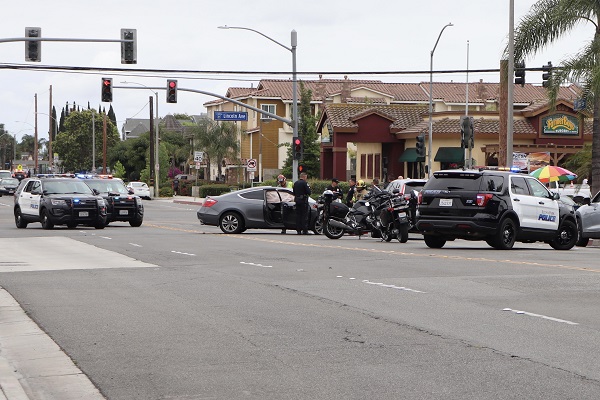headline news online news
By Skyler Swisher
Orlando Sentinel
(Orlando Sentinel) Trumpeting his support of law enforcement, Gov. Ron DeSantis signed bills on Friday that will limit the authority of police civilian review boards and restrict bystanders from getting too close to officers during investigations. online news
HB 601 bars citizen review boards from investigating allegations of officer misconduct. The review boards can continue to operate but only in an advisory role that provides input on policies and procedures, not individual officer actions.
The other measure (SB 184) creates a 25-foot buffer around police officers, firefighters and emergency personnel when they are working. Bystanders who disregard a verbal warning and approach with an intent to interfere, harass or threaten could be arrested and charged with a misdemeanor.
Backed by a line of officers, DeSantis touted both measures as creating a better climate for law enforcement and accused other states of fomenting hostility toward the police.
Citizen review boards can bring an “agenda” to their work, and other processes are in place to initiate disciplinary proceedings against the police, he said.
“They’re not free to use law enforcement as political pinatas,” DeSantis said at a bill-signing event in St. Johns County. “They’re not free to create false narratives. They’re not free to try to make it miserable … to work in uniform.”
Supporters of SB 184 creating the 25-foot barrier said emergency workers shouldn’t have to deal with harassment from the public when they are engaged in life-saving work.
headline news online news
Both measures drew criticism. Defenders of police review boards say they provide independent accountability to law enforcement officers and build community trust.
Review boards provide another important perspective in addition to internal affairs investigations, said state Rep. Tom Keen, D-Orlando.
(Please click onto the image of the cat to hear Classical music)

“It does provide citizens with some transparency,” said Keen, who served on Orlando’s review board before being elected to the House. “It is a good thing. A good department should never fear a citizen police review board.”
Orlando created its board in 1992 in the aftermath of the Los Angeles riots sparked by the police beating of Rodney King. The board reviews internal affairs investigations and policies and procedures. Board members can concur with the findings of an internal investigation, disapprove or ask for more investigation.
The board has no subpoena power, and its recommendations are not binding.
Florida has 21 civilian police oversight boards, according to the LeRoy Collins Institute, a nonpartisan policy organization at Florida State University. Other Central Florida cities with review boards include Kissimmee and Ocoee.
Orlando is reviewing the changes to review boards and will have additional information before the law goes into effect on July 1, city spokeswoman Ashley Papagni said. City officials in Kissimmee and Ocoee could not be immediately reached for comment.
Florida’s First Amendment Foundation urged DeSantis to veto the bill creating a barrier around law enforcement and emergency workers, objecting to what it called “vague and highly discretionary language.”
For instance, the bill speaks of “willfully” engaging in conduct that “serves no legitimate purpose” and “intentionally causes substantial emotional distress” to responders, said Bobby Block, executive director of the foundation, in an email.
“These are highly subjective terms which we believe will have a chilling effect on journalists’ and citizens’ First Amendment rights to observe and record the activities of responders at work,” Block said. “Similar laws have been struck down by the courts as being unconstitutional for this reason.”
©2024 Orlando Sentinel. Visit at orlandosentinel.com. Distributed by Tribune Content Agency, LLC.
headline news online news


